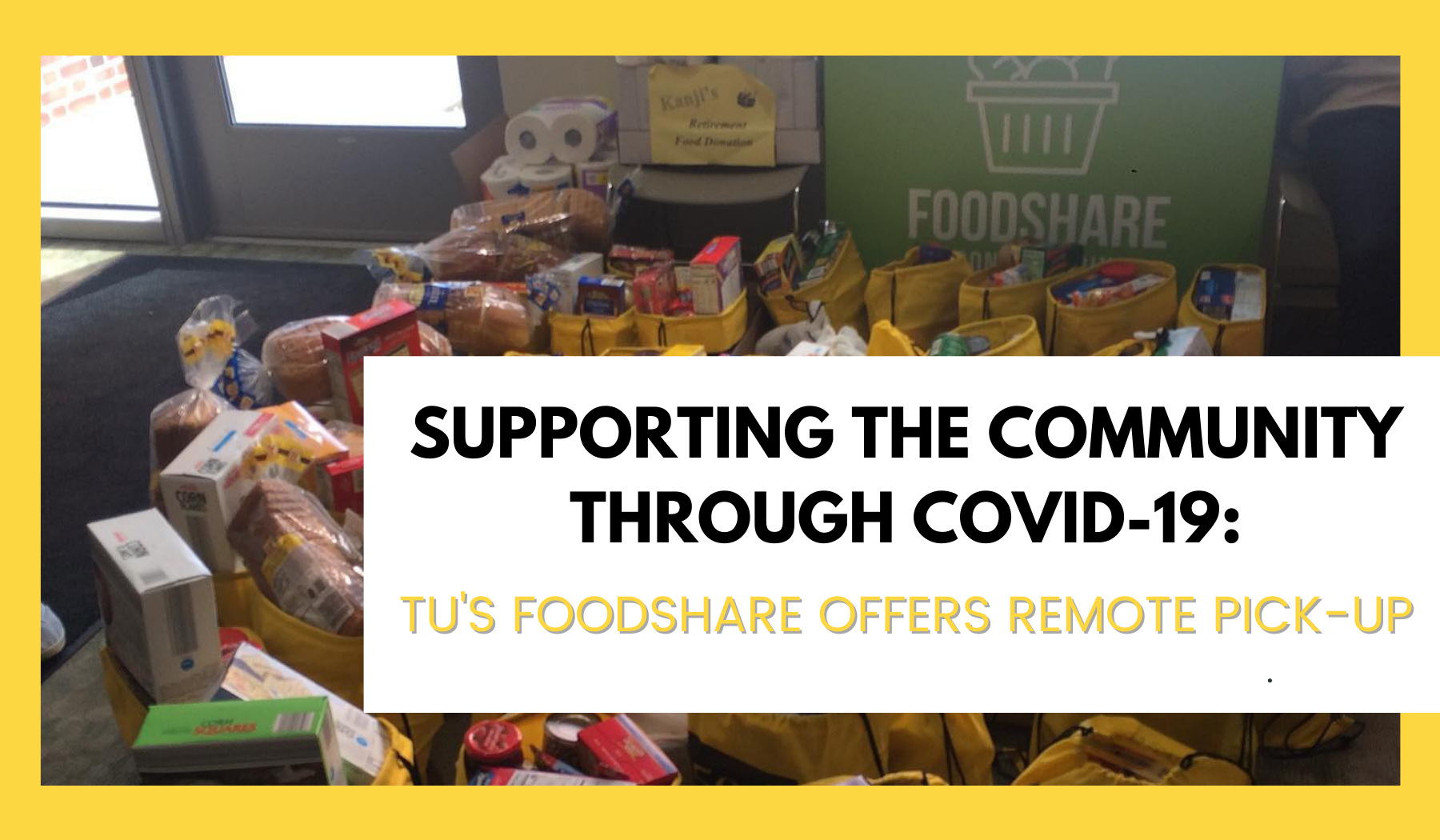
Supporting the community through COVID-19: TU’s FoodShare offers remote pick-up option
By: Nina Gayleard, Contributing Writer
Towson University’s (TU) FoodShare program is continuing to serve students, faculty and staff facing food insecurity through the COVID-19 pandemic by expanding to remote pick up locations.
After recognizing a need for food in the community, The Office of Civic Engagement & Social Responsibility, Office of Sustainability and the Division of Student Affairs collaborated with Pastor Laura Sinche from The Table, a Lutheran Episcopal ministry to create the FoodShare program, four and half years ago.
The FoodShare pantry, which provides weekly food items as well as kitchenware, laundry detergent, soap, feminine hygiene products and more, is fully supported through donations. Typically, the pantry, located at the Health and Counseling Center, is open during regular academic semesters for in-person shopping.
The pantry closed briefly at the onset of the pandemic in March, leaving FoodShare leaders to reevaluate how to operate in a quarantined state.
“It basically stayed closed until late August, and then reopened two days per week for six hours total,” said Luke Birdsong, CCMA AmeriCorps VISTA member for the TU Food Security Initiative. “One day didn’t really get that much traffic, and even on the other day there really wasn’t too much traffic relative to what the pantry saw in the past. That was very likely because of people dealing with this situation and everything that entails, and also the fact that some people weren’t in the area.”
According to Birdsong, the FoodShare program tried to find a way to address the lack of in-person interaction by setting up remote pick-up locations with FoodShare bins.
“We can put bags filled with what they wanted in them, rather than prepackaged bags that would have led to a lot of food waste,” Birdsong explained. “So anyone can go to the pick up site and pick up the bag that was made for them, and we have had a really big uptick since we’ve done that. About double or triple the amount that we had prior.”
Not only did the pick up locations help the FoodShare’s interaction with the community, but according to Sinche, it allowed for more flexibility.
“We have been able to implement a remote location for food bag drop-offs, which has been very helpful for FoodShare guests, instead of them having to only access FoodShare during hours we’re open or having to schedule an appointment ahead of time,” Sinche said.
Senior, Rachel Wax, feels that programs addressing food insecurity are important now more than ever due to the pandemic. However, she believes there may be a lack of awareness about the FoodShare.
“I’d like to think it helps, but I feel like a lot of people are unaware that it exists,” Wax said.
Another senior, Jordyn Parks, was unaware of the program.
“Now that I am aware of what the program is, I do think it is very beneficial for TU to support and have available for anyone in need,” Parks said. “Donating items to students and faculty can help bring together the community and help all parties involved.”
Birdsong explained that first, students must complete the FoodShare online intake form, and then submit an online pick-up request. Guests can select up to 10 items per week. When the requested bag is ready, an email will notify the guest, and the bag will be conveniently placed in a green FoodShare bin on the second floor of the University Union for pick-up.
“There’s no qualification process or anything,” Birdsong said. “All you have to do is fill out a registration form. Anybody who’s affiliated with the campus that has an ID can come and utilize the services of the Foodshare.”
Birdsong also notes that the FoodShare will also work with community members to help address holistic issues.
“At any time, people can schedule an appointment to discuss things more in-depth, and they can always email the FoodShare if they have a unique circumstance,” said Birdsong. “At the very least we can provide them with a better direction. Food insecurity is usually just one part of greater financial insecurity in certain circumstances.”
One online resource that Birdsong created, and the FoodShare points students towards, is the Maryland Food Bank Resource Guide, which is catered towards students who are not directly in the Towson area due to virtual learning.
He also explained how the program typically receives support from student volunteers, but they are unable to do so during the pandemic. However, he made the program’s dedication to serving the community clear.
“During COVID-19, it’s a lot of trial and error to see what’s going on, but the FoodShare won’t be closed if anyone is in need of food,” Birdsong said.
According to Sinche, the contactless, remote pick-up option is likely to become a permanent option for the FoodShare program long after the COVID-19 pandemic.
“It’s been so helpful for guests with unpredictable schedules,” said Sinche.
This spring semester, the FoodShare plans to have open hours on Thursdays from 3:00 p.m. to 6:00 p.m. in addition to the continuation of the remote pick-up option.
TU members can reach out to the FoodShare program by emailing [email protected] with any questions.

